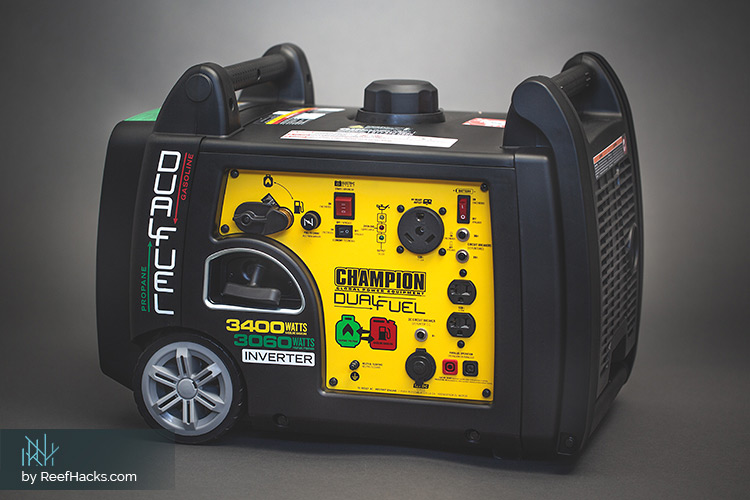It’s hard to imagine life without electricity. Actually, I think it’s hard to imagine life without anything that’s simplified living.
That is until there’s a power outage. In a matter of seconds, you’re thrust back into the dark ages, literally. Sure, the occasional power outage isn’t much to fear. As long as it comes back before your iPhone, laptop or Kindle dies, then all’s well that ends well.
But, what if it doesn’t?

Author:
As a lifelong aquarist, Yuliya has an endless curiosity about our underwater universe. After graduating with a bachelor’s in Environmental Engineering, she transformed her passion into a successful career. While working at the Institute of Environmental Protection in Moscow, her passion for saltwater and reef aquariums only increased. Moving to the United States in 2013, Yuliya embarked on another impactful journey by sharing her unprecedented experience for all aquarium hobbyists ... Read More.
More importantly, what if there’s an entire microcosm in your living room at risk of dying? Well, if you’re a reefer than this is a question you need to answer.
Power outages happen when you’re expecting them, like during a thunderstorm, but some are just plain random, like when a neighborhood squirrel made a bad decision. For something that isn’t uncommon, it’s interesting how common it is to see aquarists living without an emergency plan. This is especially true for reefers who live in an area not prone to serious natural disasters, such as hurricanes, tornadoes or earthquakes.
Unfortunately, living in a world where you imagine bad things won’t happen isn’t actually living. I’ve seen far too many hobbyists helplessly watch as their handwork dissolves into a murky pit of dead critters. While there’s dozens of reasons why your power can go out, the impact it has on a reef tank is universal: disastrous.
Previously, I discussed several power outage hacks. Interestingly, as I prepared its draft, Hurricane Florence came whipping through my area. Talk about coincidence. Bracing for the worst, we were lucky. Our power was out for roughly four hours and my aquarium suffered little damage. Unfortunately, not everyone along Florence’s path was as lucky.
What’s the best storm prep tool for reef tanks?
Living relatively close to the Southeastern Atlantic coastline, the threat of severe storms isn’t a foreign topic. Of course, when I first moved here, it was definitely a shock to experience my first serious storm. Before then, I couldn’t help but giggle when a neighbor bragged about their emergency supplies.
I quickly changed my tune after sitting through, which was more like trembling under a thick blanket in the basement, a tornado-producing thunderstorm. From that moment, I dedicated myself to the refined art of preparation.
It wasn’t long until my meager supply shelf transformed into a well-stocked supply closet. As an advocate for preparation, I’m often asked what’s the best storm prep tool for a reef tank?
While I tend to avoid proclaiming a specific product as being the best, I have no problem letting you know what the best type of tool for any reefer.
In my opinion, power generators are an absolute must. Think about it. Your entire aquarium ecosystem is only made possible thanks to electricity. Without the various pieces of equipment responsible for oxygenating water, exporting nutrients, providing light energy and even supplement dosing, that beautiful slice of the ocean sitting in your living room would be a deathtrap.
As long as you have access to power, it’s possible to keep your tank healthy and stable throughout an electrical outage. Of course, just how long you keep access depends on one overarching factor: generator size and efficiency.
If you’ve never researched generators, you may walk into this buying quest thinking it’ll be as straightforward as buying lightbulbs. I hate to be the one to tell you this, but it’s not. The generator marketplace is literally overflowing. What you thought would be a limited shopping experience reveals itself to be an endless catalogue of sizes, functions, fuel types and wattage ratings.
Then there’s the special considerations. You aren’t simply powering your Kindle or hot plate. You require a generator capable of handling the power requirements of a self-contained world. After spending hours researching and speaking with my fellow aquarists, one generator kept appearing. This was none other than the Champion Dual Fuel Generator 3400-Watt.

Conquer the Silence of Darkness - Champion Power Equipment.
Even if you’re not a huge power tool hobbyist, you’re likely familiar with Champion Power Equipment. In many ways, Champion is the benchmark for user-friendly, yet robust, power equipment. While I’m not going to dive into their complete history, there’s several hallmarks worth nothing.
Founded in Sante FE Springs, California, Champion first made waves with its 2003 product line. Since then, they’ve expanded operations throughout the United States, which is also where products are designed and engineered. While their product offerings include a variety of tools, like engines and log splitters, they’re the undisputed champion of power generators.
After doing a little pre-purchase research, I uncovered Champion has sold over 2.5 million power generators, and that’s just in North America. With figures like that, I surely knew at least one reefer who relies on this product. Not only was I right, but the majority of my reefing buddies with a power generator used a Champion product.
This was all I needed to know.
Confident I made the right choice, I ordered my very own Champion Dual Fuel Generator 3400-Watt (Model #100263). So, how do I like it?
Let me tell you about it…

Champion Dual Fuel Inverter Wattage Review.
Like buying any piece of equipment for your reef tank, the best way to start this process is understanding tank requirements. If you were looking to upgrade your flow pump, for example, you’d need to know your tank size, coral requirements and other unique metrics. The same’s also true when buying a power generator.
So, what’s the most important metric when it comes to aquarium generators?
Wattage.
Essentially, wattage is the total power your tank requires to run its entire system. This includes all essential devices, such as flow pumps, skimmers, heaters, nutrient export equipment, etc. There’s several ways to calculate aquarium wattage requirements. The easiest, albeit not the most accurate, is to research the average operating wattage is for each system device. Of course, this isn’t a definitive number, but it can give you a general ballpark figure.
After a little research and calculating my findings, I discovered that my tanks consume an average of 300 to 900 watts running only basic-level equipment. While this is enough power to keep my tank from disaster, after a little more math, I discovered my entire system consumers an average of 3,100 watts. If you’re a lucky owner of the APEX Controller (see the full review here), you’ll be able to see even more accurate numbers for your energy consumption in the ApexFusion Dashboard.
Obviously, I’d only run minimal equipment should the power outage be expected to last many days. However, I wanted a generator powerful enough to completely power my system during shorter outages. And this Champion Dual Fuel Generator 3400-Watt does just that.

What’s the Deal with Dual Fuel Inverters?
For years, I assumed “dual fuel” generators weren’t anything too fancy. Numbed by the years of outlandish marketing statements, it wasn’t until I researched this feature that I understood its true nature. Basically, dual fuel means this champion dual fuel generator can run on either propane or gasoline. Additionally, it also can run on low-wattage (anywhere from 10 to 30-Watts) thanks to its 0.6-quart oil container.
As you may already know, fuel type determines more than running cost or filling convenience. The biggest difference between gasoline and propane is runtime. Here’s a brief breakdown:
- Gasoline - Capable of running for 7.5 hours at a 25% maxim load.
- Propane (20 pound tank) - Much better running duration at 14.5 hours at a 25% maximum load.
With a maximum running power of 3100-Watts of the Champion inverter, I can easily power my entire aquarium system, but not nearly for as long as I could if I only ran the most essential devices.

Inverter technology is way cooler than you may know.
My friend recently confessed he thought “inverter” was just another term for any standard generator. To my surprise, not very many people actually understand the benefits of using an inverter power generator over its traditional counterpart.
Without getting into too much detail, inverters reduce electrical loading, which means less-noisy operation, extended fuel economy and prolonged engine lifespan, which is an impressive 192cc Champion inverter. This smart technology really does make a difference in terms of how long the generator can continuously operate. Definitely a plus when it comes to powering a reef aquarium.

Be a champion of power with Champion dual fuel generator.
Although buying a power generator isn’t the most sultry of activities, this Champion dual fuel generator has several surprisingly exciting features. Her’s a brief list of my personal favorites:
- Cold Start Technology - This is a huge feature for those who live in cold climates. When winter weather tightens its grasp, more than snow can fall to the ground. Like power lines, for examples. If you’ve ever tried to start a traditional generator in freezing temperatures, the you know how much time, energy and patience this takes. Thankfully, this Champion inverter eliminates this stress with the Cold Start Technology system, which basically prevents the cold from disrupting the electric-start sequence.
- Economy Mode - Not sure when your power will be restored? Or, in a more dire situation, running low on fuel? Economy Mode realigns power output settings to reduce fuel consumption for longer operation.
- Outlet and Plug Options - Just because you’re saving an entire underwater ecosystem doesn’t mean you can’t charge your phone at the same time. While not recommended when facing a serious lack of fuel, you can charge a variety of devices thanks to the dual USB adapter, two 120V household outlets, 12V DC outlet and a 120V 30A RV outlet.
Champion Dual-Fuel Inverter Review - Final Thoughts.
When it comes to protecting your aquarium, you must learn how to actively prevent both known and unknown threats. And one of the most serious unknown threats is a power outage. While you may know when it could happen, there are many times when it’s completely unexpected.
Ultimately, I’m beyond pleased with my Champion Dual Fuel Inverter. It’s easy to use, integrates perfectly with my aquariums and is built to last for a long time. If you’re interested in creating a stronger prevention plan, I highly recommend this Champion dual fuel generator!
by Yuliya Ivanova for ReefHacks.




